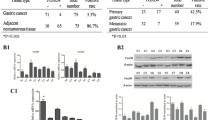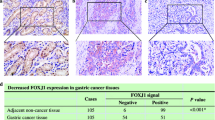Abstract
Background and Aims
The transcription factor forkhead box A2 (FOXA2) plays a central role in the development of endoderm-derived organs. It has been reported that FOXA2 acts as a suppressor in many kinds of tumor. However, little is known about the role of FOXA2 in gastric cancer.
Methods
The expression of FOXA2 in gastric cancer tissue samples from 89 patients was assessed by immunohistochemistry, and the clinicopathological characteristics of the samples were analyzed. The human gastric cancer cell line, BGC-823, was used to investigate the effects of FOXA2 in gastric cancer in vitro and in vivo and the potential mechanism involved was explored.
Results
FOXA2 expression in human gastric cancer cell lines and human gastric cancer tissues was lower compared with the normal gastric epithelium cell line GES1 and normal adult gastric tissues, respectively. Patients with high FOXA2 expression level had longer 5-year overall survival than those with low FOXA2 expression level. FOXA2 markedly inhibited growth of BGC-823 cells accompanied with the cell cycle arrest and apoptosis. Infection of BGC-823 cells by FOXA2 lentivirus resulted in reduced cell tumorigenesis in vitro and in vivo. Moreover, expression of Mucin 5AC was up-regulated along with increased expression of exogenous FOXA2 in BGC-823 cells; in contrast, dedifferentiation markers, BMI, CD54 and CD24, were down-regulated.
Conclusions
These results suggest that FOXA2 induces the differentiation of gastric cancer and highlight FOXA2 as a novel therapeutic target and prognostic marker for human gastric cancer.






Similar content being viewed by others
References
Danaei G, Vander Hoor S, Lopez AD, Murray CJ, Ezzati M. Causes of cancer in the world: comparative risk assessment of nine behavioural and environmental risk factors. Lancet. 2005;366:1784–1793.
Siegel R, Naishadham D, Jemal A. Cancer statistics, 2012. CA Cancer J Clin. 2012;62:10–29.
Schrem H, Klempnauer J, Borlak J. Liver-enriched transcription factors in liver function and development. Part I: the hepatocyte nuclear factor network and liver-specific gene expression. Pharmacol Rev. 2002;54:129–158.
Xu L, Hui L, Wang S, et al. Expression profiling suggested a regulatory role of liver-enriched transcription factors in human hepatocellular carcinoma. Cancer Res. 2001;61:3176–3181.
Yin C, Lin Y, Zhang X, et al. Differentiation therapy of hepatocellular carcinoma in mice with recombinant adenovirus carrying hepatocyte nuclear factor-4α gene. Hepatology. 2008;48:1528–1539.
Zeng X, Lin Y, Yin C, et al. Recombinant adenovirus carrying the hepatocyte nuclear factor-1alpha gene inhibits hepatocellular carcinoma xenograft growth in mice. Hepatology. 2011;54:2036–2047.
Friedman J, Kaestner K. The Foxa family of transcription factors in development and metabolism. Cell Mol Life Sci. 2006;63:2317–2328.
Lee CS, Sund NJ, Behr R, Herrera PL, Kaestner KH. Foxa2 is required for the differentiation of pancreatic α-cells. Dev Biol. 2005;278:484–495.
Lee CS, Friedman JR, Fulmer JT, Kaestner KH. The initiation of liver development is dependent on Foxa transcription factors. Nature. 2005;435:944–947.
Wan H, Kaestner KH, Ang SL, et al. Foxa2 regulates alveolarization and goblet cell hyperplasia. Development. 2004;131:953–964.
Wang H, Gauthier BR, Hagenfeldt-Johansson KA, Iezzi M, Wollheim CB. Foxa2 (HNF3β) controls multiple genes implicated in metabolism-secretion coupling of glucose-induced insulin release. J Biol Chem. 2002;277:17564–17570.
Wolfrum C, Asilmaz E, Luca E, Friedman JM, Stoffel M. Foxa2 regulates lipid metabolism and ketogenesis in the liver during fasting and in diabetes. Nature. 2004;432:1027–1032.
Halmos B, Bassères DS, Monti S, et al. A transcriptional profiling study of CCAAT/enhancer binding protein targets identifies hepatocyte nuclear factor 3β as a novel tumor suppressor in lung cancer. Cancer Res. 2004;64:4137–4147.
Miyamoto K, Fukutomi T, Akashi-Tanaka S, et al. Identification of 20 genes aberrantly methylated in human breast cancers. Int J Cancer. 2005;116:407–414.
Akagi T, Luong Q, Gui D, et al. Induction of sodium iodide symporter gene and molecular characterisation of HNF3β/FoxA2, TTF-1 and C/EBPβ in thyroid carcinoma cells. Br J Cancer. 2008;99:781–788.
Tang Y, Shu G, Yuan X, Jing N, Song J. FOXA2 functions as a suppressor of tumor metastasis by inhibition of epithelial-to-mesenchymal transition in human lung cancers. Cell Res. 2010;21:316–326.
Song Y, Washington MK, Crawford HC. Loss of FOXA1/2 is essential for the epithelial-to-mesenchymal transition in pancreatic cancer. Cancer Res. 2010;70:2115–2125.
Liu M, Lee DF, Chen CT, et al. IKKα activation of NOTCH links tumorigenesis via FOXA2 suppression. Mol Cell. 2012;45:171–184.
Li Z, Tuteja G, Schug J, Kaestner KH. Foxa1 and Foxa2 are essential for sexual dimorphism in liver cancer. Cell. 2012;148:72–83.
Sekiya T, Muthurajan UM, Luger K, Tulin AV, Zaret KS. Nucleosome-binding affinity as a primary determinant of the nuclear mobility of the pioneer transcription factor FoxA. Genes Dev. 2009;23:804–809.
Cereghini S. Liver-enriched transcription factors and hepatocyte differentiation. FASEB J. 1996;10:267–282.
Montgomery RK, Mulberg AE, Grand RJ. Development of the human gastrointestinal tract: twenty years of progress. Gastroenterology. 1999;116:702–731.
Tenen DG. Disruption of differentiation in human cancer: AML shows the way. Nat Rev Cancer. 2003;3:89–101.
Hatziapostolou M, Polytarchou C, Aggelidou E, et al. An HNF4α-miRNA inflammatory feedback circuit regulates hepatocellular oncogenesis. Cell. 2011;147:1233–1247.
Richmond CA, Breault DT. Regulation of gene expression in the intestinal epithelium. Prog Mol Biol Transl Sci. 2010;96:207.
McGuckin MA, Lindén SK, Sutton P, Florin TH. Mucin dynamics and enteric pathogens. Nat Rev Microbiol. 2011;9:265–278.
Buisine M, Devisme L, Savidge T, et al. Mucin gene expression in human embryonic and fetal intestine. Gut. 1998;43:519–524.
Buisine MP, Devisme L, Maunoury V, et al. Developmental mucin gene expression in the gastroduodenal tract and accessory digestive glands. I. Stomach: a relationship to gastric carcinoma. J Histochem Cytochem. 2000;48:1657–1665.
Sell S. Stem cell origin of cancer and differentiation therapy. Crit Rev Oncol Hematol. 2004;51:1–28.
Ning BF, Ding J, Yin C, et al. Hepatocyte nuclear factor 4α suppresses the development of hepatocellular carcinoma. Cancer Res. 2010;70:7640–7651.
Acknowledgments
This research was sponsored by the China National Key Projects for Infectious Disease (2013ZX10002007-007), the National Natural Science Foundation of China (Key Program 81230011) and the Innovation Program of Shanghai Municipal Education Commission (13ZZ061).
Conflict of interest
None.
Author information
Authors and Affiliations
Corresponding author
Additional information
Chang-Peng Zhu, Jian Wang, and Bin Shi have contributed equally to the work.
Electronic supplementary material
Below is the link to the electronic supplementary material.
Rights and permissions
About this article
Cite this article
Zhu, CP., Wang, J., Shi, B. et al. The Transcription Factor FOXA2 Suppresses Gastric Tumorigenesis In Vitro and In Vivo. Dig Dis Sci 60, 109–117 (2015). https://doi.org/10.1007/s10620-014-3290-4
Received:
Accepted:
Published:
Issue Date:
DOI: https://doi.org/10.1007/s10620-014-3290-4




